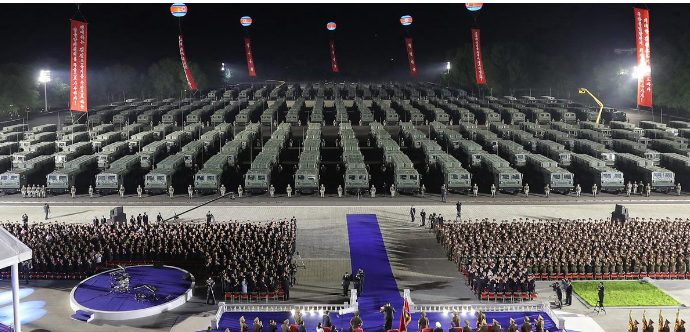North Korea Deploys 250 Missile Launchers to Southern Border: Tensions Escalate:-
North Korea Deploys 250 Missile Launchers in a dramatic and alarming escalation of military tensions on the Korean Peninsula, North Korea has deployed 250 missile launchers to its southern border. This significant military movement has sparked widespread concern among neighboring countries and the international community, raising the specter of a potential conflict in a region already fraught with volatility. The deployment underscores the fragility of peace in the region and the challenges in maintaining stability amidst escalating rhetoric and military posturing.
Background: A History of Tension
The Korean Peninsula has long been a focal point of geopolitical tension. The division of Korea into North and South following World War II, North Korea Deploys 250 Missile Launchers and the subsequent Korean War (1950-1953), resulted in an armistice but no formal peace treaty. This has left the two Koreas technically still at war, separated by the heavily fortified Demilitarized Zone (DMZ).
North Korea, under the leadership of Kim Jong-un, has frequently engaged in provocative military actions and rhetoric, often in response to joint military exercises between South Korea and the United States or perceived threats to its regime. The North’s missile and nuclear programs have been central to its strategy of deterrence and have been a source of international sanctions and diplomatic efforts aimed at denuclearization.
Recent Developments: The Deployment
The deployment of 250 missile launchers is one of the largest military movements by North Korea in recent years. According to intelligence reports, the launchers are equipped with a variety of missiles, including short-range ballistic missiles (SRBMs) and possibly medium-range ballistic missiles (MRBMs). These missiles are capable of reaching significant portions of South Korea, including the capital city of Seoul, home to millions of people.
Satellite imagery and reconnaissance have confirmed the movement of these launchers to positions near the DMZ. The exact locations and readiness status of the missiles remain classified ,North Korea Deploys 250 Missile Launchers but the presence of such a large number of launchers so close to the border has understandably heightened tensions.
International Reaction: Calls for Restraint
The international community has reacted with concern and calls for restraint. The United Nations Security Council convened an emergency session to address the situation, urging North Korea to de-escalate and return to dialogue.
UN Secretary-General António Guterres issued a statement expressing deep concern over the military buildup and called for all parties to engage in constructive dialogue. “The deployment of missile launchers near the border is a provocative action that risks further destabilizing the region. North Korea Deploys 250 Missile Launchers ,We urge all parties to exercise maximum restraint and to seek peaceful resolutions through dialogue and diplomacy.”
South Korea’s Response: Heightened Alert
South Korea has placed its military on heightened alert in response to the deployment. The South Korean government has condemned the move as a severe provocation and a violation of previous agreements aimed at reducing military tensions on the peninsula.
President Yoon Suk-yeol convened a meeting of the National Security Council to assess the situation and coordinate a response. In a public address, President Yoon reassured the South Korean people that their safety and security were the government’s top priorities. North Korea Deploys 250 Missile Launchers “We will not tolerate any threats to our sovereignty and will take all necessary measures to protect our nation and our people. We urge North Korea to immediately withdraw its missile launchers and engage in meaningful dialogue.”  for more information click on this link
for more information click on this link
The Role of the United States
The United States, a key ally of South Korea, has also responded with concern. The Pentagon confirmed that it is closely monitoring the situation and is in constant communication with South Korean counterparts. Secretary of Defense Lloyd Austin reiterated the United States’ North Korea Deploys 250 Missile Launchers commitment to the defense of South Korea, emphasizing that any attack on South Korea would be met with a decisive response.
In a statement, the White House called on North Korea to de-escalate and return to the negotiating table. “The United States remains committed to the denuclearization of the Korean Peninsula and to the security of our allies. We call on North Korea to halt its provocative actions and to engage in constructive dialogue aimed at achieving lasting peace and stability in the region.”
Potential Consequences: The Risk of Miscalculation
The deployment of missile launchers significantly increases the risk of miscalculation and unintended conflict. With both sides on high alert, North Korea Deploys 250 Missile Launchers even a minor incident could quickly escalate into a broader confrontation. The close proximity of the missile launchers to the DMZ means that any perceived threat could trigger a rapid and potentially catastrophic response.
Experts warn that the situation is extremely volatile. Dr. Kim Sung-han, a professor of international relations at Korea University, noted that “the deployment of such a large number of missile launchers is highly provocative and increases the risk of an accidental or deliberate clash. Both sides need to exercise extreme caution and engage in urgent diplomatic efforts to prevent a crisis.”  for more information click on this link
for more information click on this link
Diplomatic Efforts: Seeking a Path to Peace
Amidst the rising tensions, there are renewed calls for diplomatic engagement. China and Russia, both of which have historically played significant roles in North Korean diplomacy, have called for restraint and dialogue. Chinese Foreign Minister Wang Yi emphasized the need for a peaceful resolution, stating that “all parties must avoid actions that could escalate tensions and should work towards a peaceful and negotiated settlement.”
The European Union has also expressed concern and called for de-escalation. The EU’s High Representative for Foreign Affairs, Josep Borrell, urged both Koreas to return to the negotiating table and to refrain from any actions that could further destabilize the region. The Humanitarian Dimension
Beyond the immediate security concerns, there is a significant humanitarian dimension to the crisis. The Korean Peninsula is home to millions of people who would be directly impacted by any military conflict. The deployment of missile launchers and the resulting heightened tensions exacerbate the already challenging humanitarian situation in North Korea, North Korea Deploys 250 Missile Launchers where the population faces chronic food shortages, lack of medical supplies, and severe economic hardships.
International humanitarian organizations have called for measures to protect civilians and to ensure that humanitarian aid can reach those in need. “We must not lose sight of the human cost of this conflict,” said a spokesperson for the International Committee of the Red Cross. “Any escalation would have devastating consequences for the civilian population. It is imperative that all parties prioritize the safety and well-being of civilians and allow humanitarian aid to reach those in need.”
Historical Context: Lessons from the Past
The current situation recalls previous periods of heightened tension on the Korean Peninsula, such as the 2017 missile crisis, when North Korea’s missile tests and nuclear threats brought the region to the brink of conflict. During that time, intensive diplomatic efforts, including high-level summits between North Korea and the United States, North Korea Deploys 250 Missile Launchers eventually led to a reduction in tensions and a period of relative calm.
However, those efforts did not result in lasting peace or denuclearization, highlighting the challenges of achieving a sustainable solution. The current crisis underscores the need for a comprehensive and long-term approach to peace and security on the Korean Peninsula, one that addresses the underlying issues and builds trust between the parties.  for more information click on this link
for more information click on this link
Moving Forward: The Need for a Comprehensive Approach
Addressing the current crisis requires a multifaceted approach that combines diplomatic, military, and humanitarian strategies. Diplomatic efforts must focus on reopening channels of communication and building trust. This could involve renewed negotiations, confidence-building measures, and potentially a new framework for peace talks that includes key stakeholders such as China, Russia, Japan, North Korea Deploys 250 Missile Launchers and the European Union.
From a military perspective, both Koreas need to implement measures to reduce the risk of accidental conflict. This could include the establishment of hotlines, the withdrawal of certain military assets from border areas, and joint agreements on non-aggression.
Humanitarian efforts are also crucial. The international community must ensure that humanitarian aid reaches those in need in North Korea, and that efforts to improve the lives of ordinary North Koreans continue, regardless of the political and military tensions.
Conclusion: A Call for Unity and Peace
The deployment of 250 missile launchers by North Korea to its southern border represents a significant escalation in an already tense situation. It underscores the fragile nature of peace on the Korean Peninsula and the urgent need for diplomatic efforts to prevent a potential conflict. The international community must respond with a unified and comprehensive approach that North Korea Deploys 250 Missile Launchers prioritizes dialogue, de-escalation, and the protection of human lives.
As history has shown, the path to lasting peace on the Korean Peninsula is fraught with challenges, but it is not impossible. Through sustained diplomatic efforts, military restraint, and a commitment to humanitarian principles, North Korea Deploys 250 Missile Launchers it is possible to navigate this crisis and move towards a more stable and peaceful future for the region.
In the words of UN Secretary-General António Guterres, “Peace is not just the absence of conflict; it is the presence of justice, security, and hope. Let us work together to build a future where the Korean Peninsula is a place of peace and prosperity for all its people.” ALSO READ:- Tie with U.S. Should Be Repaired But Not at China’s Pakistani Prime Minister 2024





